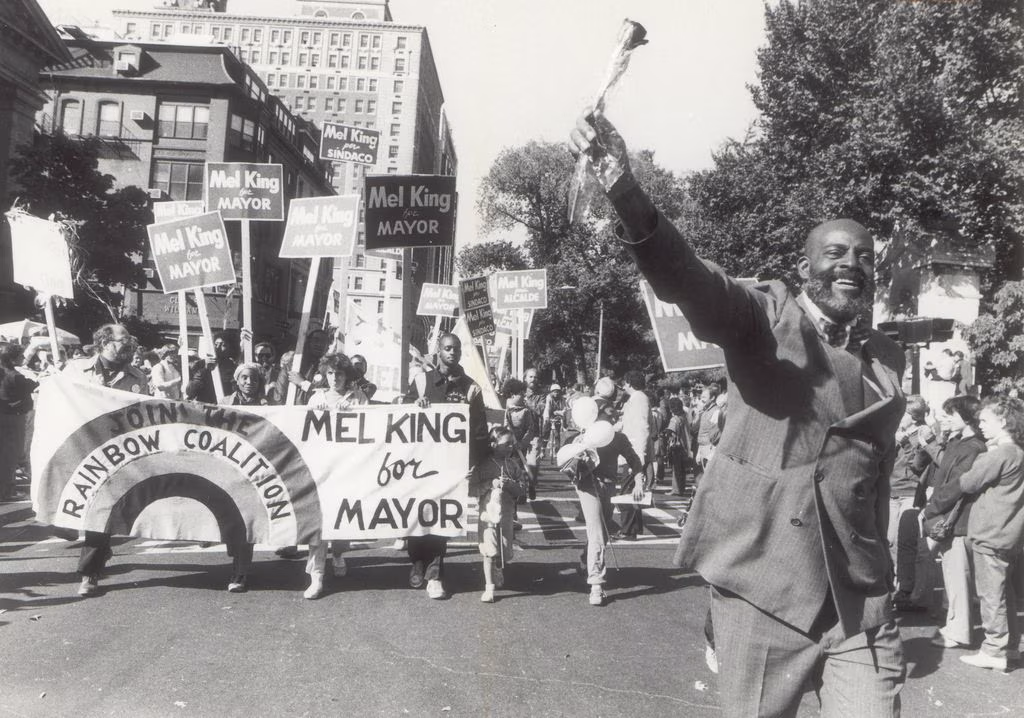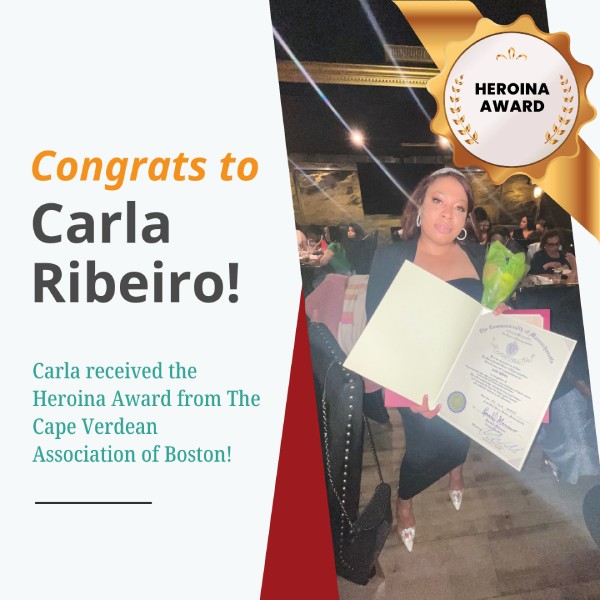Mr. King, marching in the Columbus Day parade in the North End as part of his campaign for mayor of Boston. JOE DENNEHY/GLOBE STAFF
By Mark Feeney Globe Staff, Updated March 28, 2023, 8:42 p.m.
Mel King, the longtime political activist and former state representative from the South End who in 1983 became the first Black person to reach a Boston mayoral general election, died Tuesday morning in his South End home. He was 94.
His wife, Joyce, said Mr. King, who had fallen about a year and a half ago, had been ill in recent months and was briefly hospitalized at Boston Medical Center before saying he wanted to return home three days ago.
“We knew that it was close,” she said, adding that at the end “it was quiet and peaceful.”
In a statement Tuesday night, Boston Mayor Michelle Wu said that “for decades, Mel King taught us all how to serve, how to build, and how to love. His impact and legacy stretch across the boundaries of neighborhood, race, class, and status. His transformative ideas have shaped generations of organizers and leaders who are driving us closer toward his vision today.”
Mr. King lost by 30 points to Raymond L. Flynn in 1983, 65 percent to 35 percent. Yet his campaign had a larger significance than his vote total might indicate. It helped close a dark chapter in Boston history while opening a notable new one in national politics.
Mr. King’s place as a mayoral finalist and the consistently positive tone of the campaign indicated that the racial strife occasioned by court-ordered desegregation of the public schools in the mid-’70s had subsided. The civility of the election was especially striking in that Flynn had been a leading opponent of desegregation.
“The city was racially divided, but the campaign wasn’t divisive,” Flynn later said. “That campaign, with its aggressive discussion of the issues, showed we could disagree without being disagreeable. It was the first sign of wounds beginning to heal. Campaigns can divide, but they can also unite.”
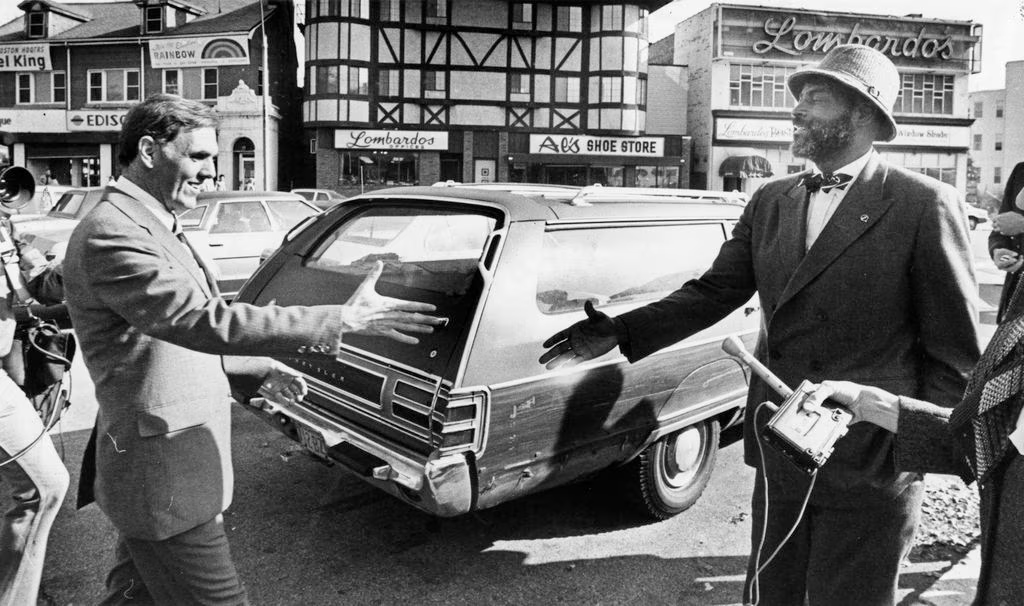
Mr. King campaigned as head of the Rainbow Coalition, seeking to enlist all racial groups under a general banner of progressive politics. Mr. King bequeathed the name to the Rev. Jesse L. Jackson, for his National Rainbow Coalition, the centerpiece of Jackson’s presidential bids in 1984 and 1988.
“What I believe people want more than anything else,” Mr. King said in a 1993 Globe interview, “is a sense of a vision that’s inclusive and respectful and appreciative of who they are. What the Rainbow Coalition did was to put that right up front because everybody could be a member.”
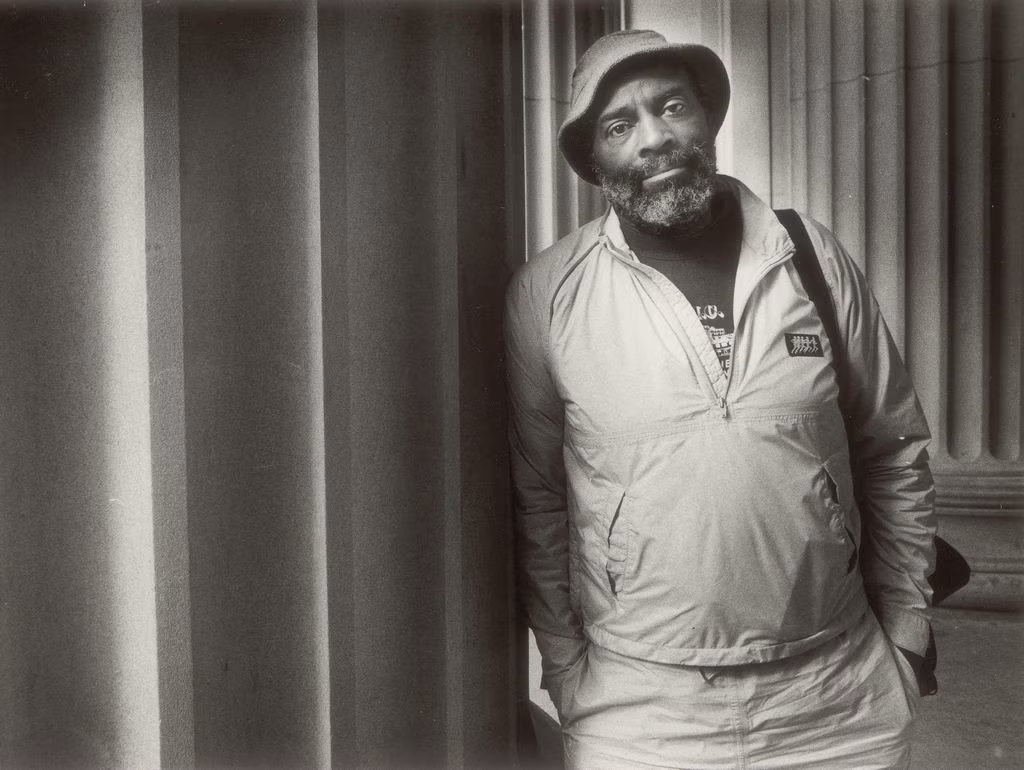
State Representative Christopher Worrell, a Democrat representing the 5th Suffolk District, tweeted Tuesday night that Mr. King “did the work that few would have tried to do. He confronted so many of the problems we are still facing at a time with far less support and understanding. He was a hero for Black Boston and his work will always be remembered.”
And Ruthzee Louijeune, city councilor at-large, tweeted that Mr. King’s “legacy endures in every corner of this city. I was so lucky to learn from him & his vision.”
Mr. King cut a memorable figure. He had an impressively severe glower, its intimidating effect not altogether dispelled by the warmth of an equally impressive smile.
Standing 6 feet 3 inches tall, Mr. King carried himself like a champion athlete. In fact, he starred in three sports at Boston Technical High School, went to college on a football scholarship, and was a devoted tennis player well into his 80s.
Further contributing to Mr. King’s distinctive look were his shaven head, full beard, and idiosyncratic style of dress. In 1973, a South Shore Democrat expressed his dismay over Mr. King’s penchant for wearing dashikis and jumpsuits with a point of order on the House floor, questioning whether such attire was “according to custom and tradition.” House Speaker Thomas W. McGee declined to make a ruling, noting the absence of a dress code for members. Going to the other extreme, Mr. King later developed a penchant for wearing bow ties.
Mr. King’s appearance made his style as a political activist seem all the more confrontational. Asked in a 1988 Globe interview if he had mellowed, Mr. King replied with laughter. “The name is Mel, you know. I don’t mind being called a radical . . . but it doesn’t mean I’m not mellow. I’m a mild-mannered person, but I have the capacity for outrage when the circumstances demand it.”
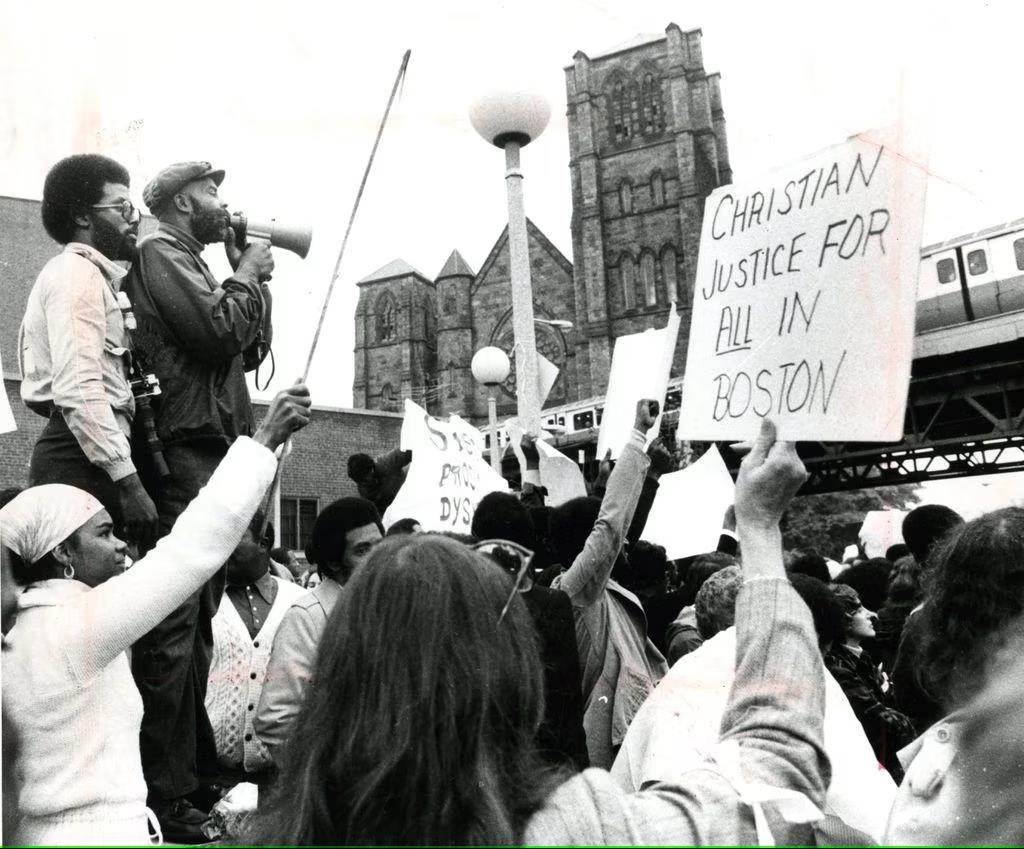
Leading 4,000 demonstrators in 1968 to protest the lack of low-income housing in the city, Mr. King was arrested (though charges were later dropped, something he always claimed to regret). Eventually, the Tent City mixed-income housing development was built on the site of the demonstration, across from Back Bay Station. Forty-five years later, on the verge of his 85th birthday, Mr. King was arrested along with other activists for barring the entrance to Boston’s Municipal Court building to protest homeowner evictions.
In 1969, Mr. King led a controversial — and much-publicized — protest at the annual dinner of the United Fund (precursor of the United Way) to criticize what he saw as inequitable distribution of donations to the minority community. He and two dozen other protesters gathered up leftovers at the banquet and dumped them on the head table.

Often accused of radicalism, Mr. King acted locally but also thought globally. He said during the ’83 mayoral campaign that he would welcome a visit to Boston by Yasser Arafat, leader of the Palestine Liberation Organization. He also said that, given a choice between Fidel Castro and Ronald Reagan, he preferred Castro (because he’d done more for the poor). Mr. King used the occasion of Pope John Paul II’s 1979 visit to Boston as an opportunity to protest the city’s racial climate.
“I’m 75 years of age,” Mr. King said in a 2004 Boston Phoenix interview, “and I’ve been an activist for 75 years.”
Melvin Hugs King was born on Oct. 20, 1928, in Boston, one of 11 siblings. His father, Watts Richard King, was a longshoreman who’d emigrated from Barbados. His mother, Ursula (Earle) King, was an immigrant from Guyana.
Mr. King earned a bachelor’s degree from Claflin College, in South Carolina, in 1951. That same year he married Joyce Kenion. Mr. King’s undergraduate years were the only time he lived outside the South End. Returning home, he earned a master’s degree in teaching from Boston Teachers College (which later became Boston State College and then merged with the University of Massachusetts Boston). He also did postgraduate work at Boston and Northeastern universities.
Mr. King taught at Boston Trade and Boston Technical high schools for a year, then became a social worker at the South End Settlement House. He later ran an alternative “freedom school” there.
Mr. King’s work with young people attracted the attention of a reform group, Citizens for Boston Public Schools, which drafted him for its slate of candidates for the School Committee in 1961. It was the first of three unsuccessful School Committee campaigns for Mr. King. He also ran in 1963 and 1965.
In 1967, Mr. King became executive director of the Urban League of Greater Boston, a position he held until 1971. That year, he founded the Community Fellows Program at the Massachusetts Institute of Technology, where he became an adjunct professor of urban studies and planning. The program brings leaders from minority communities to MIT for a year of research and study.
Elected to the Legislature in 1972, Mr. King spent five terms in the State House. He soon earned a reputation as a gadfly on Beacon Hill. Nevertheless, he sponsored several measures that won passage. Mr. King proposed the legislation that began community garden programs in Massachusetts, for example, and that made Martin Luther King Jr.’s birthday a state holiday.
Although Mr. King had finished a surprising third running for mayor in 1979, few gave his candidacy much chance in 1983. He finished a very close second to Flynn in the primary election, taking 28.6 percent of the vote.
Both Mr. King and Flynn had run as populist outsiders, casting themselves as advocates of the city’s neighborhoods against the downtown business interests that had flourished under the four-term incumbent, Kevin H. White. The desire for change went only so far, however, and Flynn won in a landslide. Even so, Mr. King said on election night, his campaign had been a watershed event, “what historians will recognize as a turning point in the social, cultural, and political history of Boston.”
In 1986, Mr. King ran for the seat of retiring US House Speaker Thomas P. O’Neill Jr. Joseph P. Kennedy II won the race, with Mr. King finishing a distant third. That was his last run for office, though he briefly contemplated another mayoral bid, in 1993.
Mr. King remained active in politics, launching the Rainbow Coalition Party in 1997. Calling Democratic welfare and immigration policies “unconscionable,” Mr. King said, “I cannot be identified with parties that have those kinds of policies, and which really don’t care about workers.” In 2002, the Rainbow Coalition Party merged with the Massachusetts Green Party to form the Green-Rainbow Party.
Mr. King was the author of “Chain of Change: Struggles for Black Community Development” (1981) and editor of “From Access to Power: Black Politics in Boston” (1986). He was also an enthusiastic amateur poet.
After retiring from MIT, Mr. King served as director of the South End Technology Center@Tent City, which provides computer-based information technology to low-income people.
“On behalf of the City of Boston, we send our deepest condolences to the King family and the many, many loved ones, mentees, and friends of Mel,” Wu said in her statement. “With gratitude and determination to keep fighting, Rest in Power.”
Funeral arrangements are pending for Mr. King. A complete list of survivors, in addition to his wife, Joyce, was not immediately available.
In 2021, the intersection of Yarmouth Street and Columbus Avenue, in the South End, was named Melvin H. “Mel” King Square in his honor.

“I want to make sure the city is working for everybody,” Mr. King said in a 2004 Globe interview. “We just need to hold hands and understand that love is the question and the answer.”
Tonya Alanez of the Globe staff contributed to this report.
Mark Feeney can be reached at mark.feeney@globe.com.

